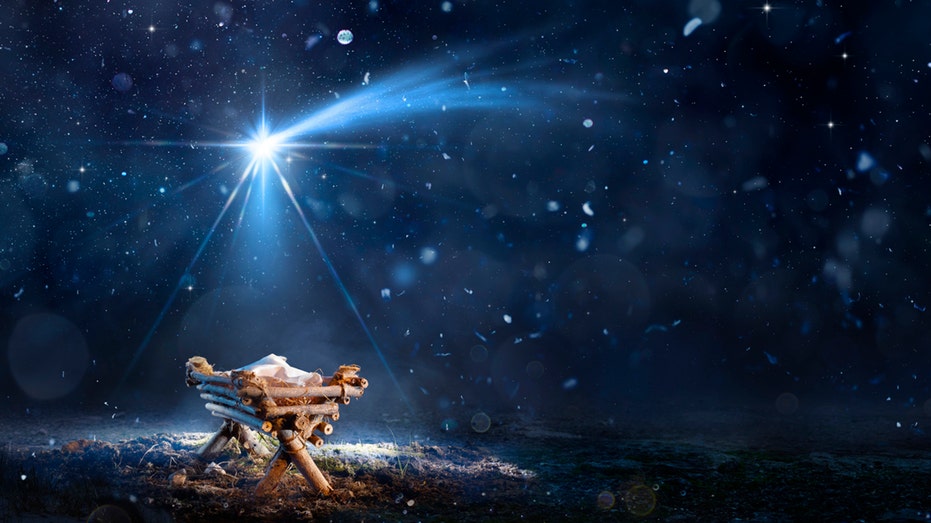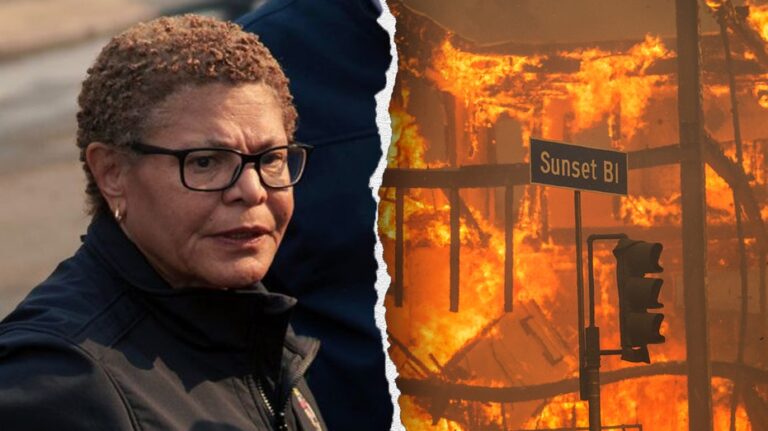
The birth of Jesus at Christmas is all about hope, peace, joy and love, writes Lauren Green of Fox News this holiday season — here’s why this matters and the origin stories of each.
The Advent season is about preparing our hearts, minds and souls to welcome the birth of the King of Kings. It is those magical and mystical weeks after Thanksgiving that lead to Christmas — and as Pastor Max Lucado has said, Advent is to Christmas what Lent is to Easter.
The two big Christian holy days are eternally linked. Lucado told Fox News, “Christmas begins what Easter celebrates.”
Christmas is about the birth of Jesus. Easter is about what He was born to do.
ADVENT REMINDER: JESUS CHRIST BROUGHT ‘TRUE PEACE’ TO THE WORLD, SAYS TEXAS PASTOR
In the last few decades, that knowledge has taken a back seat to the hustle and bustle of shopping, parties and Santa Claus. Even the “comfort and joy” heralded is more about general feelings of delight and glee than the meaning of the birth of the Lion of Judah.
As one theologian said, all of these things are fine — but we should remember that they all flow from one event: the birth of the Savior.
Just as with the meaning of each Advent candle, there are four things to keep us laser-focused on what Christmas is all about — and what it leads us to know and understand.
They are the hope prophesied in the Old Testament; the peace of the Incarnation; the joy it brings; the love we can experience — and Jesus Christ as the culmination of all.
When the first candle was lit, it begins the hope that is in every human heart, that there is a love that surpasses all understanding. That hope has its origins in the Old Testament.
Woven through the Bible’s Old Testament are hundreds of prophecies that tell of a Messiah, a Savior, that will be born sometime in the future. Many of the prophecies, like those in Isaiah, were written centuries before the birth of Jesus.
MARTIN SCORSESE PROFILES ST. MAXIMILIAN KOLBE, PATRON SAINT OF PRISONERS AND DRUG ADDICTS
Cumulatively, they predict the conditions of His birth, meek and lowly; the location of His birth, Bethlehem; to whom He will be born, a virgin; and what He is coming to do — the Lamb of God who takes away the sins of the world.
Hank Hanegraaff, the Bible Answer Man, said that if we just look at the geneology of Abraham, Isaac and Jacob — through to the tribe of Judah and the royal line of King David, King Solomon and continuing up to the beginning of the New Testament, the Gospel of Matthew — Jesus is the strongest candidate for this Messianic figure.
Hanegraaff says, “The lineage is so precise that no imposter can walk through the doorway of that prophecy.”
Theologians aren’t all in agreement as to how many of the Old Testament prophecies Jesus fulfills. It could be anywhere from 100 to 400.
However, evangelist Anne Graham Lotz, the daughter of Billy Graham, says Isaiah’s prophetic voice is one that many are familiar with.
Says Graham, “That there would come the Messiah who would be a wonderful counselor, Almighty God, Prince of Peace, Everlasting Father — and by His stripes we would be healed.”
One of the strongest ties from the Old to New Testament, says Lotz, is the Exodus, in which the Israelites were told to put the blood of a lamb on the doorpost so the angel of death would pass over. The Israelites would be saved by putting themselves under the protection of the blood of a lamb.
JUST IN TIME FOR CHRISTMAS, HUSBAND RECEIVES MIRACULOUS ‘GODWINK’: ‘COMPLETELY HEALED’
For centuries after the Exodus, Jews remembered the Passover by sacrificing a lamb. The sacrificial lambs had to be without blemish. So the shepherds, who watched after these animals, wrapped their legs with strips of cloth, aka swaddling cloths, to protect them from injury.
It was a dirty job, tending the sheep. It was also considered defiling. So shepherds were not allowed into the temple where the sacrifices took place.
A little more than 2,000 years ago, the Bible says when the angels came to announce the birth of Jesus, they came first to those shepherds tending the sheep.
From Luke 2:10-14: “Then the angel said to them, ‘Do not be afraid, for behold, I bring you good tidings of great joy which will be to all people. For there is born to you this day in the city of David a Savior, who is Christ the Lord. And this will be the sign to you: You will find a Babe wrapped in swaddling cloths, lying in a manger.’”
Says Lotz, “They were in the fields outside of Bethlehem. That’s where the Passover lambs were kept. And so God … was announcing to these shepherds who watched over the Passover lambs that would be sacrificed in the temple, that the Passover lamb had been born.”
As for the strips of cloth, the swaddling clothes — this is how the shepherds would know this was the long-awaited Messiah, the Lamb of God.
There are many historians and archeologists who doubt the Bible’s account of the Exodus. That would mean, if the account of a mass migration of tens of thousands of Jews is not true, then it would also negate much of the biblical narrative, including the sacrificing of the lambs.
But investigative filmmaker Tim Mahoney says there is evidence of the Exodus. Mahoney is the director and producer of “Patterns of Evidence: Exodus.”
3 ADVENT FOOD TRADITIONS, EACH ‘WITH ITS OWN STORY,’ FROM AROUND THE WORLD
He said on a recent episode of the “Lighthouse Faith” podcast, “I can tell you that there’s archeological evidence of a smiting of the Egyptians. And then in our films, it shows that this group of people just leave.”
Mahoney added, “And so the evidence in the Old Testament is there for setting up this understanding that there would need to be a sacrificial lamb. And that is, you know, the story of Christ coming to be this pure, part-man, part-God being who would be sacrificed for our sins.”
The second Advent candle gives us the peace our heart craves. But it can only happen when we understand the Incarnation.
While the birth of Jesus describes what happened that first Christmas, it’s the Incarnation that tells us what it means.
It means that the Creator of the Universe took on human flesh and made His dwelling among us.
This is the part that separates Christianity from every other religion.
The Gospel of John tells it most poignantly by echoing the opening of Genesis, “In the beginning was the Word and the word was with God and the Word was God.”
A more probing analysis of that line finds that the Greek word for “word” in most English translations doesn’t really get to the heart of what John is telling us.
The Greek word for “word” is Logos. It means far more than words on a paper or even the spoken word.
MARTIN SCORCESE BRINGS ST. SEBASTIAN’S STORY OF STEADFAST FAITH, MARTYRDOM, TO FOX NATION
The Logos is the underlying reality that is holding up the world. It means the science, the philosophy, the nature of the physical world as well as all that we experience — they meet as one in this Logos.
And what John is saying is that this Logos took on human flesh and made His “dwelling among us.”
Further scrutiny reveals much about the word “dwelling.” Some translations will use the word “tabernacled,” which divulges a tie to its historical context.
“And the Word [Logos] became flesh and Tabernacled among us.”
The Tabernacle of Moses was the portable tent and mobile temple. It was the Israelites’ dwelling place for God as they wandered in the wilderness. The Incarnation, “God with us,” means God dwells within. He is the living and breathing Tabernacle.
Hanegraaff says this is no small matter: “This is not just an event. It’s not just a discussion. It’s the discussion. The Incarnation separates all of human history.”
Christianity makes a claim that no other religion makes, that Jesus IS God. It’s not that Jesus has divine qualities or is divinely inspired. He is God come to us in human form.
One pastor said, “You can reject the claims, but don’t mistakenly believe Jesus is just a teacher or adviser.”
Said Timothy Keller, “The Gospel is Good News, not good advice.” The Gospel is the Good News of what God has done to save us, not a set of teachings about how we can save ourselves.
Keller was the founder of Redeemer Presbyterian Church in New York City; he passed away in 2023.
CHRISTIAN AUTHOR, FAMED PASTOR RECEIVING HOSPICE CARE AT HOME: ‘CAN’T WAIT TO SEE JESUS’
In his 1991 sermon “God With Us,” he revealed why people shouldn’t be offended at Christianity’s exclusive claims. He also understood how those claims don’t sit well in a pluralistic culture in which all religions are treated equally.
Said Keller, “Every other religion says morality and goodness is enough … Christianity comes along and says, ‘No. Your situation is so dire that morality and goodness will never be enough. The unique Son of God had to come and die for you and you have to put all your hope and trust in Him.’”
Keller said this is not narrowness. Instead, “it’s a radically different diagnosis of your problem.”
For example, he said, “Suppose you were sick and you’d gone to see several other doctors. And every one of them said, ‘It’s not serious, just rest and drink lots of fluids and you’ll be fine.’ But what if I came along, and I’m a doctor and I say to you, ‘The other doctors are wrong. You are terminal unless you take this particular medicine.’ How would you respond to me? Would you say, ‘I don’t want to deal with you because you’re narrow-minded’? No. You’d say, ‘You’re either right or you’re wrong, but you’re not narrow-minded. I need to find out if you’re right.'”
Said Keller, “I may be crazy, or I may be a liar, or I may be right. But it has nothing do with narrowness.”
The third Advent candle is about Joy.
There’s certainly a lot of it in New York City, though it’s considered one of the most secular places in the world. Yet it is known as one of the top cities to visit for Christmas, regardless of a person’s religious background.
Among the options every December, thousands attend the “Messiah” sing-along at Lincoln Center.
People of different cultures, races and religions come together armed with their own vocal scores to sing what could be considered a divinely ordained musical masterpiece.
The libretto of George Friedrich Handel’s “Messiah” is a version of the biblical narrative of redemption, a compilation of Old and New Testament verses of Scripture that talk of this Messiah, Christ the Lord, who comes to us.
“He shall purify the sons of Levi” — that “surely, He has born our griefs and carried our sorrows.” And of course, “Hallelujah, the Kingdom of this world is become the kingdom of our Lord and of His Christ. And He shall reign forever and ever.”
Handel’s “Messiah” is the luxury car version of the Christmas carol. But carols are just as theologically rich with the reality of Christmas.
SOUP AT PASTOR’S CHRISTMAS POT LUCK GOES VIRAL: ‘IT’S MY FAVE FOOD’
“Joy to the World, The Lord is come … Joy to the earth, the Savior reigns … No more let sin and sorrow grow … He comes to make these blessings flow, Far as the curse [sin] is found.”
Pastor Lucado says that while Christmas has gotten overly commercialized with all the buying and selling, the Christmas carols piped into retail outlets are opportunities for people to hear the Christmas story. Says Lucado, “You know, when I go into a shopping mall and I hear ‘Silent Night’ [and other songs], there’s Gospel in those songs.”
As the fourth Advent candle is lit and we look at Christmas Eve, it is time to see the fullness of this event.
Lucado says forgetting that Christmas is about the birth of Jesus would be like forgetting the Fourth of July is about the founding of America.
Says Lucado, “Can you imagine if all of a sudden on the 4th of July we could not mention the United States or the birth of our country? Even if you’re not pro-American, you acknowledge that the reason this event happens is the birth of our country.”
In the end, says Lucado, “the Christmas story is about a narrative that no human being could have ever imagined: It’s about our great Creator, our blessed Lord, the God who has always been, who has all power, and who holds the entire universe in the palm of his hand.”
He said, “God loved us so much that He chose to enter the world, but not as a king or as an emperor, but as a baby. And not just as a baby — but in the most humble circumstances imaginable.”
Lucado is a bestselling author whose books have sold over 150 million copies. He spoke on the “Lighthouse Faith” podcast recently, saying the most important thing to remember about Christmas is that this is about hope and love.
Jesus was not born in a chalet or in a palace, or in a large city like Rome or Athens, but born instead in some forgotten little one-camel town called Bethlehem.
CLICK HERE TO SIGN UP FOR OUR LIFESTYLE NEWSLETTER
He entered the world through the birth canal of a simple Jewish girl into the calloused hands of a simple carpenter.
Says Lucado, “The way He entered the world is, to me, the message of Christmas, that He would so love us, that He would become like us. And that He would so be like us. That there would never be a person who would say, ‘Jesus cannot understand me.’”
He added, “Because if you’re poor … Jesus has been poor. If you’re forgotten … Jesus was forgotten. If you’re cold … Jesus was cold. Everything that any human could ever experience, our Savior experienced.”
Lucado also said, “That’s the message of Christmas — how far Christ would go to reach the people he loves.” The message of Christmas is, “For God so loved the world…”
For more Lifestyle articles, visit www.foxnews.com/lifestyle
The fifth and final Advent candle, of course, is the one we light on Christmas Eve.
This candle represents Jesus — the culmination of the previous four. He is our hope, our Peace, our Joy, and our Love.



